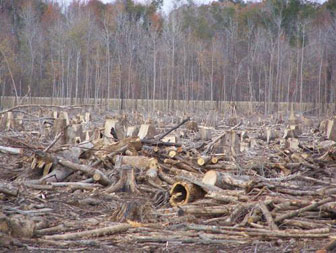Fast-food industry destroying forests in the Southern U.S.
Fast-food industry destroying forests in the Southern U.S.
Morgan Erickson-Davis, mongabay.com
April 28, 2008
|
|
The Southern forests of North America supply 60% of US and 15% of global paper demands. Deforestation for wood and paper products, along with urban sprawl, has resulted in a total decline from 356 million acres in colonial times to 182 million acres today. The South contains more threatened forest ecosystems than anywhere else in the US. A major perpetuator of deforestation in the South is the fast food industry. With nearly 100 paper packaging mills in the South and thousands of restaurants worldwide, major fast food retailers such as KFC and Taco Bell are leaders in paper consumption and subsequent waste. The Dogwood Alliance (dogwoodalliance.org), a nonprofit organization formed to increase awarness of the importance of Southern forests and the threats their survival, has launched a new campaign at nofreerefills.org which specifically targets the paper packaging practices of the fast food industry.
“Southern forests are (among) the most bio-diverse forests in the world”, says Dogwood Alliance Media Outreach coordinator Lauren Barnett. “These forests contain high concentrations of rare and endangered species.” The Southern forests also function as major carbon sinks, regions that are incredibly important in their ability to remove carbon from the atmosphere and sequester it in trees and soil. Not only are carbon-gathering trees being felled to create products which ultimately find their way to landfills where they decay and release carbon into the atmosphere; “the large-scale industrial forestry practices that are used to supply the fiber that is turned into fast food packaging are major contributors of carbon emissions since bound carbon is exhausted from the soil when forests are cleared and managed intensively with chemical fertilizers.”

|
Overall, the Southeastern US has the highest number of endangered ecosystems in the country. More than 30 percent of all native Southeastern plant communities have become critically endangered due to habitat loss and degradation. Many Southern forest communities are now limited to only a small fraction of their original range, resulting in 25 endangered and 14 critically endangered communities. Because of this, 18 mammal, 20 bird, 40 reptile, and 54 amphibian species are now classified as imperiled.
Fast food industry giants such as Wendy’s, Pizza Hut, and McDonalds are some of the largest consumers of paper products in the US. “Every year millions of pounds of food packaging waste litter our roadways, clog our landfills and spoil our quality of life. Southern forests, the jewel of the American landscape, are being destroyed to bring you fried chicken, burgers and fries, and super-sized convenience in a glut of wrappers, boxes and cups” says Barnett. For example, Americans use 15 billion disposable hot beverage cups every year, with projections reaching 23 billion by 2010. To curb this excess, Barnett suggests that “consumers bring plastic containers from home when having a meal out and reuse these containers repeatedly.”
Dogwood Alliance is calling on fast food retailers to implement a series of practices in order to reduce their impact on the environment, such as reducing packaging materials, employing 100% post-consumer recycled boxboard, eliminating paper packaging originating from endangered forests or industrial pine plantations, recycling their own waste in effort to divert it from landfills, and creating partnerships to improve forest management. Barnet stresses that “simple choices and creative solutions can reduce the excess and destruction while still allowing us to enjoy the level of convenience we have come to expect.”
 White Marsh Clearcut, outside of the Green Swamp, NC. Image courtesy of the Dogwood Alliance. |
An example of the impact of a business implementing even very small changes is that of Starbucks, who recently shifted from completely non-recycled paper to a 10 percent recycled post-consumer cup. This change alone will result in an annual drop of about 11,000 tons of wood used and 47 million gallons of water.
When asked what individual consumers can do to help save the Southern forests, Barnett has a number of suggestions. “(They can visit) our Web site, nofreerefills.org to educate themselves on our campaign and the facts concerning fast food packaging. Then ask fast food companies to Save Southern Forests by helping our effort.” Many small in-home changes can also help. “Dining in rather than on-the-go also reduces overall packaging use. When shopping, purchase products that utilize less paper, and buy recycled paper and Forest Stewardship Council (FSC) certified products.”